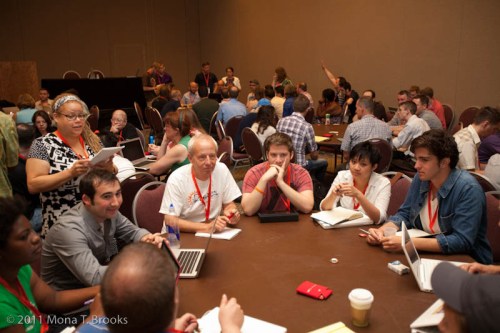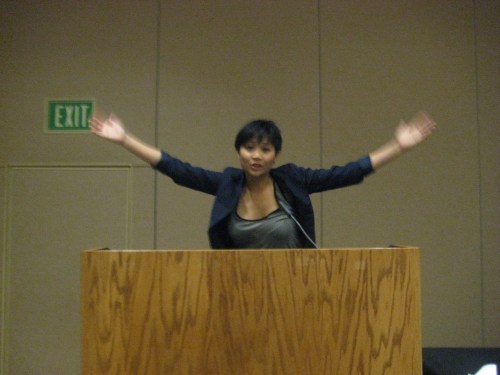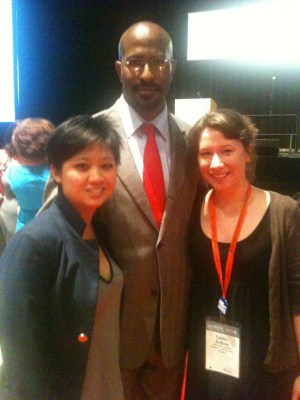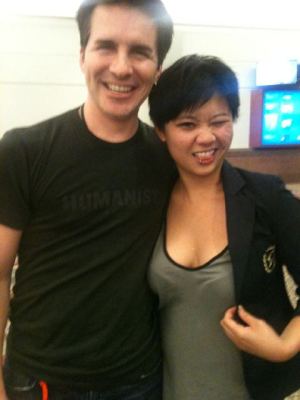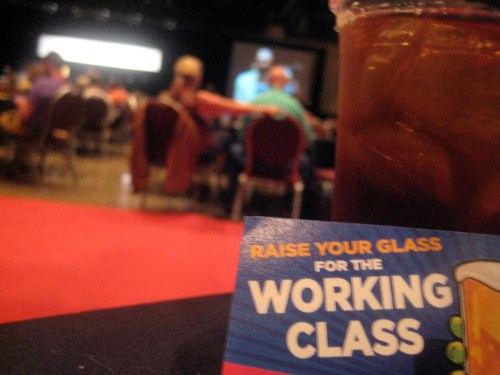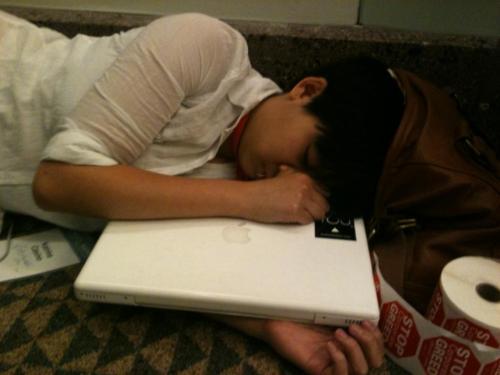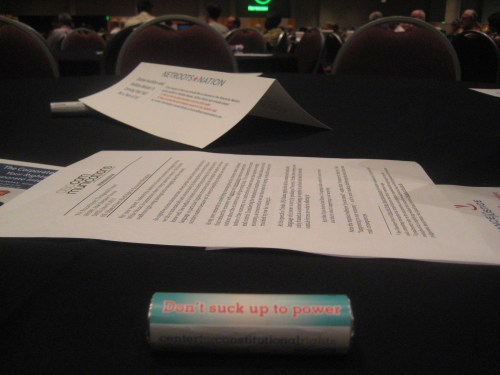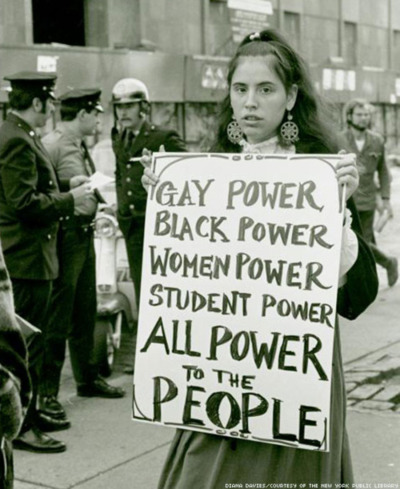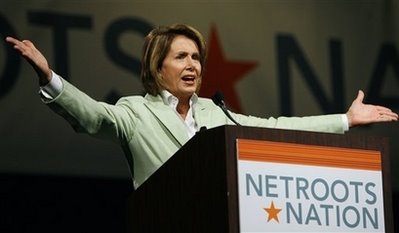How to Queer Mainstream Media and Progressively Start a Revolution Online
Remember when you were in grade school/high school/college, and you used to go on field trips? And while you were out, it was all about how cool it was that you weren’t sitting at a desk all day, and instead you were looking at dinosaurs or art or learning how caramel is made. Maybe getting stoned behind the museum. Whatever. You were out there. You were doing it, and you were having fun. But at the end of the day, your teacher sat you down and made you write the same essay again and again: What did you learn?
And I’ve done it. I’ve gone on the ultimate field trip. I put in my ~30 hours of travel time, attended (and spoke at, what the fuck?) my first national conference, talked to a million and one different kinds of activists, watched a naked man dance to what I swear was a 12-minute Britney Spears remix at a gay club in Minneapolis, stood on a picket line, heard a lot of really strange Katy Perry stories, and got drunk on the roof of Chicago’s last squat. And now here I am, back home in DC eating hummus in my kitchen at 3 in the morning. And so, the test: what have I learned?
It’s hard to say. The things I’ve learned seem impossible to list. Everything I try to name sounds inaccurate or irrelevant, and it’s probably because I’m shooting to articulate the way-more-intangible concept of ‘What I’ve Experienced.’ Because this conference – as well as the time directly surrounding it – has been more than politics and TweetDeck and open bars.
When this conference was first pitched to me, it was summarized as something along the lines of ‘a conference for progressive organizations that use blogging/social networking sites as a primary means of outreach.’ For some reason I heard this and understood it as ‘people who Google ‘lesbian sex’ and end up on Autostraddle.com.’
I mean, okay, maybe I didn’t get on that train of thought and ride it all the way to the end, but I did assume (or hope) that this conference was going to be something of an experience neatly tailored ‘for me.’
And in a way, it was.
But no, really, look at this fucking photo. I mean, I feel like I’m showing you vacation slides, but this photo was taken at the first workshop I attended, an LGBT strategy session for individuals involved in policy and the bloggers who covered them. At this table were writers and editors from Bilerico, Feministing, The New Gay, Death and Taxes, and a mainstream newspaper from Minneapolis all participating in a discussion moderated by Pam Spaulding.
But this conference wasn’t ‘for’ us. Nor was it obligated to be. I ran into individuals I met at this session at almost every workshop I attended (and basically all of them at the gay bar on Saturday night). We regarded each other as peers, as co-workers in the big, intangible company that is the Internet. But in most sessions I found myself out of place – the blogger among organizers, the lesbian writer among political analysts. It’s not to say that I felt disregarded or disrespected. It may have been all the open bars, but I didn’t meet anyone this past weekend who wasn’t interested in trading issues, discussing tactics, or at least figuring out what there was to do at night.
But a larger question exists. In a conference that centered largely around taking back America by empowering the working and middle classes, where do LGBT issues fit in, and how do we contribute?
The Little Mermaid’s got it right, you guys. Subverting the mainstream isn’t just for hipsters anymore. Our media is here, it’s queer (sometimes), and we’re trying to get it to move beyond being ‘just’ a niche subject. In meeting progressives outside the LGBT community, I was constantly challenged with how to present Autostraddle as more than ‘a lesbian blog,’ how to make it feel relevant to the people I was talking to. Because, dammit, it is. We’re part of the conversation, we deserve that.
As queer bloggers (and readers of queer blogs) we come from a small/large/continually expanding universe in which everybody knows everybody, but not everybody outside knows us. We are bloggers and journalists, yes. But we are also immigrants and are people of color, we are workers (and we’re also the unemployed). We’re the little guy/girl/persyn whose rights are determined every day by the people in power, people who are not us.
For those of us who want to see ourselves represented and included in the media, for those of us who want to affirm that we have a voice and that, yes, we exist, the time has come for us to take matters into our own hands and demand representation for ourselves. And we do this differently. As I mentioned in my last post, there were a lot of homos at this conference. But, seemingly, only a small percentage of us were actively and primarily involved in what is regarded as alternative queer media.
There is an argument that can be made that all queer media is, by nature, alternative. And in a way, that’s true. Because, yes, it’s an ‘alternative’ to heterosexual culture, a difference that’s inherent in all of us, in the way we grew up and exist. But to truly capture the nature of alternative culture, we also have to focus on the lives and experiences and voices of marginalized groups and people within our community who find themselves underrepresented, and therefore silenced.
To me, alternative means recognizing the diversity that exists within our community while recognizing that we are still part of a larger community (and calling for that larger community to recognize us). It’s understanding that race, class, and privilege deeply impact all of our experiences. It is not drawing a dichotomy of alternative vs. mainstream media or regarding ‘their’ media and ‘our’ media as mutually exclusive.
It’s true: it’s hard to feel included in mainstream media. ‘Alternative’ is not an unprompted movement, its a reaction to exclusion. As Heidi Barton Stink, panelist on Queer Media and the Alternative Revolution, pointed out, organizations and media outlets will inevitably fail to be entirely inclusive, and when communities exist that don’t speak to you, there is sometimes no way to make yourself feel included. Sometimes you can ‘t build on communities and spaces that were not built to include you. Sometimes you have to create a space for your own voice.
So how to reconcile these things?

Left to right: David Castillo, coffee, Katrina Casino Danger, coffee, Heidi Barton Stink, coffee, Zack Rosen, coffee and cigarettes
In our panel, we discussed a cultural phenomenon known as the ‘post-gay’ identity, an identity that assumes that the ‘gay community’ has moved ‘beyond the closet,’ therefore making race, class, and gender equity that much more accessible. Post-gay sort of assumes that because we’re living in a society that’s becoming slowly but steadily more tolerant toward gays and lesbians, we have no more obstacles to overcome. Post-gay expects that women feel safe and welcome in spaces that have traditionally belonged to men. It believes that ‘mixed’ atmospheres can occur organically just because we’ve eliminated the necessity of the closet. ‘Post-gay’ is insistent on moving past struggle.
But the struggle continues. Because we’re not post-gay. We’re not post-anything, except maybe post-WWII or post-90s boy-band phenomena, both of which are fine. The LGBT community has the power to become a huge moving force in the progressive community. Why? Because we’re fucking everywhere (I mean that in every sense).
If there’s anything I’ve ‘learned’ from my experience at Netroots, it’s that the LGBT community’s got something down that everyone is finally catching on to: the fact that you can create real, meaningful community online. We have proven time and time again that we are people armed: not just with knowledge, but with community. We’ve got backup. We’re here for each other in the closets, in the streets, and online. And we can use these tools that we have to build our community and to integrate (not assimilate, there’s a difference!) into other communities who also experience a systematic deprivation of rights and liberties. Communities that are silent and separated. We know the power that the Internet has. It lets us know we’re not alone in our struggle, no matter how alienated we feel in our physical communities. Physical meeting spots were always important, they still are. But now we can reach a wider audience and create many centers of physical force. We can empower far more people and ultimately build a more intricate web of activists, artists, and thinkers. This power is ours to keep, but it’s also ours to share.
And what can the progressive community do for us?
They can recognize our passion and our power and regard us as more than tokens, as individuals, and as a cause. And we can do each other the mutual favor of learning to regard each other as allies. Last Friday, keynote speaker Van Jones discussed the baseless power of the Tea Party. Is the Tea Party a huge, scary coalition of right-wing conservatives and a snake that doesn’t want to get tread upon? Yes. But Jones pointed out something important: the Tea Party doesn’t exist. There’s no headquarters, there’s no president, there’s no physical space. But us? The queers? The progressives? We got it. We’re real. We’re online, we’re in the streets, we’re everywhere. And, goddammit, we’re on our way.
Netroots Nation 2011 Day Two: Things All Progressives Love, Actually
[feature photo via yksin on flickr]
Hello all you little tweetdecks. Netroots Nation is over, and I am hung-over and traveling on a bus through the great sprawling flatlands of the Midwest. The bus driver keeps yelling, but not at me, so I guess it’s okay. ANYWAY. Yesterday was a long, long day that began with my panel, Queer Media and the Alternative Revolution (which was not videoed but instead live-tweeted, also here) and ended with the Daily Kos official Netroots afterparty, which featured an open bar and lots and lots of older people getting drunk and dancing in business casual. Needless to say, I fit right in, and now I have this phone number on my arm in what appears to be permanent marker, and it says “ANDREW BLOG” under it, so I guess that means my networking attempts were a success.
So let’s get on with it, shall we? Yesterday after my queer media panel, I attended lunch with Keynote speaker/bad-ass Van Jones, a Speak Out for Good Jobs rally led by Rep. Keith Ellison, and a session on sustainable blogging, which can more or less be summarized by hashtag #getadayjob. Seriously you guys I am so broke that I’m about to take the dollar sign from Ke$ha’s name and try to cash it in at my bank.
Aside from that, I learned a lot. As someone who admittedly, though not necessarily proudly, shies away from most things political, it was generally healthy and stimulating and informative to be surrounded by people who know what they’re talking about and who, more importantly, are excited about what they’re talking about. I feel like it woke up a lot of things in me (but not my legs because they are forever asleep on this Greyhound), but my newly rediscovered feelings about politics are for another post. The point is that this conference brought together a great many number of people and organizations (this year’s conference was the most highly-attended Netroots to date) representing a huge diversity of opinions, causes, and peoples. Here are some things that I learned we have in common:
#Hashtags
Oh my god you guys, this conference was so fucking #meta. Being on Twitter at this conference was like watching a video of puppies watching a video of themselves. At one point I watched a group of bloggers engaged in fierce battle over the correct usage of the official hashtag of the Speak Out event I attended (it was #spkout, by the way. It said so on the banner on stage). It was like #hashtag-a-palooza up in here, let me tell you. With all hands on TweetDeck, it was almost startlingly easy to find news, opinions, and highlights from any session at the conference. Does being amazed by this make me an old lady? Because if it does, hand me the prune juice and get the hell off my lawn, because I am floored. Other Twitter highlightsincluded the fact that I substituted tweeting at new acquaintances for my lack of business cards and also the opportunity to get immediate feedback from the panel audience by checking my @ mentions while on stage. I also live-tweeted throughout most of the conference.
Also, once when I was napping unabashedly in the hallway, a huge commotion broke out on the other side of the Convention Center. Instead of removing myself from the floor, I searched the official Netroots hashtag, #nn11 and got a report on what was happening, running commentary, and even pictures. It’s like going online to check the weather instead of getting up and going across the room to open the window. Embarrassingly lazy, but so, so easy.
Being gay…maybe
I don’t actually have that much to say about this. It’s just like, you know when you’re out on the town scouting for ladies, and every girl who seems like a sure-fire lesbian is actually a hipster (though I still hold that these things are not mutually exclusive)? Well the same can be said for an older generation of progressive bloggers and political analysts. What is is about flowy skirts, sensible shoes, and power suits and conversations about someone’s six children that makes these things run abundant at a progressive conference? We’re just going to have to face it: we lesbians will forever be locked in a battle with business casual.
Other than that, it’s interesting to note the seemingly disproportionate numbers of homo-gays present at this conference. I suppose it’s a no-brainer to say that LGBT folk have a tendency to support progressive causes, but it’s nice to know that not only are we gays working toward supporting our own causes but are also infiltrating the ranks of prominent progressive organizations, ensuring that the LGBT community will not be left out of victories in politics, in the fight for jobs, in immigration, and of course, in the blogosphere.
Dorky celebrity photo ops
Netroots was a really beautiful thing for me personally because it brought together bloggers IRL and also put bloggers in touch (like real, live human touch) with the people we write about every day, whether it’s in politics or culture. I actually hate asking people for pictures, but after I reached a certain point of squealing and whispering, my girlfriend coerced me into taking these:
Okay, seriously, can we discuss how no one ever looks good in pictures like this? Even Van Jones, who looks very serious and very tough and very wise buttoned up his jacket in order to conceal what he referred to as his potbelly. This is not what I look like, I don’t look like this. In fact, I look kind of stoned, and this isn’t even what I look like when I’m stoned.
Girlfriend: “No one looks cool standing next to Van Jones, not even me. Also, it’s amazing that somewhere there was a source of light so small and so precise that it illuminated only my nose.”
I am a nerd and chicks dig it.
Beer!
There was so much free beer at this deal, you guys. The AFL-CIO taught me to raise a glass to the working class by supporting union beer breweries such as PBR, Leinenkugel, Miller, and Budweiser, as well as some considerably less-than-evil liquor distilleries (Jim Beam, Beefeater, Smirnoff). And while getting one’s drank on is a lovely social activity as well as an apparently effective social networking lubricant, it can also be an opportunity to honor the struggles of the workers and unions who fought for fair living wages, safe working conditions, and just treatment from the corporations who prospered off their work.
And it’s not just about workers not being able to trust corporations, as LGBT people, we see our beliefs and our being insulted, slammed, and sold back to us by retailers every day (Target, I am looking at you, you Born-This-Way-selling, Minneapolis-pride-sponsoring, hypocritical motherfuckers). It’s easy to feel betrayed, because we have been betrayed, but it’s hard to stop consuming. It’s hard not to feel guilty. It’s expensive to buy organic groceries farmed by Amish lesbians with multiracial children. IT’S HARD YOU GUYS. But here’s a reality: sustainable and progressive corporations exist. They are rare, but they are real. So take some advice from this sticker, y’all:
KC Danger Does Netroots Nation 2011: Day One Roundup
Dear Autofriends,
I have arrived. It has been a long and frightful(ly drunk) journey, but I did it. I am here in Minneapolis for Netroots Nation 2011, the progressive conference on online media to end all progressive conferences on online media. Where hashtags and iPads rule. Where lovers of social media, social justice, and all things leftist converge for three days to discuss strategy, tactics, and, of course, revolution. In fact, when Beyonce sang “to the left, to the left,” I think she was directing me toward Netroots.
Yes, I am here. And man, am I tired.
Contrary to what the title of this post may lead you believe, today was actually not the first day of the Netroots Nation Conference. Yesterday’s kickoff included sessions such as How to Be the Media, Our Progressive History, and What to Do When the President is Just Not that Into You, featuring Dan Choi (who, by the way, I served nachos to when he came to the restaurant I work at in DC. I also interviewed him at 2009’s National Equality March. We are, like, gay besties.).
Today’s sessions included an LGBT strategy session attended by members of The Bilerico Project, Feministing, and other alternative queer/feminist blogs. Not to mention motherf*cking Pam Spaulding of Pam’s House Blend. Dan Choi was also there briefly. I think he might be following me. The session also included members of the mainstream media, as well as policy-makers and organizers. And despite the fact that conversation was focused on highly- and frequently-discussed act of legislation (DOMA, DADT, ENDA, and UAFA) it was refreshing to find a diversity of voices willing to look past the surface of the issues. Individuals who recognize the ways in which issues such as class and race play into the queer experience. Individuals who realize that each issue is not just sweepingly political, but also deeply personal and who are willing to acknowledge that, yes, the LGBT community can be deeply divided, and to reconcile this, we must do more than seek equality, we must pursue liberation from the assumptions and prejudices that landed us with these problems in the first place.
Can you tell I’m having feelings yet?
And at the end of the day (the very end, like, even the part after happy hour), it’s not just about the workshops, the training sessions, or even the free lunch. It’s about the people who were there. It’s about this gathering of individuals who are all very aware of the fact that our struggle for equality continues, regardless of who we are or what our specific cause is. We celebrate our victories but understand that each triumph is the end of a battle, not the end of a war. We understand that organizing takes place in grassroots, but it also takes place in netroots (see what they did there?), and that as bloggers, journalists, activists, and users of social media, we are all affecting change.
Other highlights included free union beer (now I can justify my love of PBR beyond its golden trashy hipster goodness), a panel on a woman’s place in progressive politics (hint: it’s everywhere) and happy hour with a group of fucking rad organizers and associates who marched on Wal-Mart’s headquarters this past Thursday to demand respect for workers.
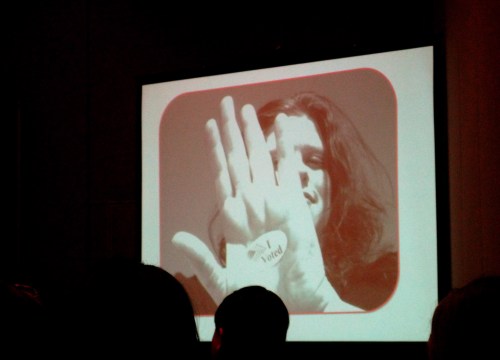
Stop! In the name of women in politics, the end of queer oppression, the use of collective bargaining, and the end of systematic injustice. Also, love.
I also met for lunch with Zack Rosen, David Castillo, and Heidi Barton Stink three bad-ass, queer, hilarious-as-f*ck mamajamas who you’ll hear more about tomorrow after our panel, Queer Media and the Alternative Revolution. And depending on how the Internet/technology feels about me, you may even get a streaming video. You all are some lucky little hashtags, I hope you know that.
And speaking of hashtags, if a daily review isn’t enough straddle for your buck, I’m also tweeting the conference all day, every day at @kcdanger.
See all you little twitters bright and early!
Autostraddle Live! KC Danger is Going to Netroots Nation 2011 With Other Revolutionaries
Hello little hashbrowns. It’s time for Autostraddle to hit the road again! This time we’re not going to a lady-mecca to reflect on our past, we’re going out into the wide world to examine our big, bright future. This Thursday, June 16, I’m leaving on a jetplane (or like, maybe hitchhiking at this point, who knows) for Minneapolis, MN to attend Netroots Nation 2011.

I'm not sure if she's dressed properly for Minnesota
Netroots Nation is a yearly conference established with the intention of amplifying the already-present voices of the progressive community online. Founded in 2006 by liberal political blog DailyKos, Netroots recognizes the online community and the legitimacy of its influence on national politics.
Originally called YearlyKos, Netroots changed its name in 2008 to reflect the influence that grassroots organizations could harness through blogs, wikis, and social networks. Recognizing the power that leftist media sites wielded individually, it soon became clear that we could build a movement collectively, if only we could realize a common struggle – as well as a common means of communication. Keynote speakers have included Bill Clinton, Nancy Pelosi and Al Franken.
It’s hard to define what the common struggle of the American Left is. And this is a message that becomes clear when looking at the agenda for Netroots. While a good number of workshops have a tendency to either be reflections on liberal media or an examination of labor/union issues, there are also a number of panels on the LGBT movement, reproductive rights, religion, the Middle East, and baseball.
And so I suppose what we have in common when it comes down to the very essentials is a fervent need for social justice. We want to believe that things can be fair and correct, that we can treat each other properly, and that these things can and should not be taken away or prohibited by any sort of legislation. And we’re recognizing this. We’re recognizing that, although our focuses may be different, we’re all a part of this community. We want to help each other help ourselves.We know that there’s nothing more powerful than information, discourse, and the exchanging of ideas and passions. And we know that it’s more powerful still because it’s free and available.
How this all plays out in a physical space is yet to be discovered. Maybe I’m too idealistic. Maybe I should just grow out my hair and start a food collective or go start a lesbian colony with Santana in Tribeca.
This year’s conference is being touted as ‘the most concentrated gathering of progressive bloggers to date.’ And we’re going to be a part of it. That’s us! As a generation of activists/generally open-minded people growing up online, we’re finding that it’s not just ideas that are accessible to us, it’s power and movement and community. We’re looking at ourselves as part of a larger progressive cause, because we’re worth that, you know? And we’re seeing that these causes are struggling right along with us.
LGBT rights are becoming part of a national dialogue. It becomes more apparent with each day, with each passing news story we post on here. We are politics. We’re activists, artists, and thinkers. We don’t just listen to lectures about our world, we have conversations about it, and often, we start those conversations online.
This thing that we’re doing? It’s a Real Thing, and we want to talk about it.
The workshop I’m participating in is called Queer Media and the Alternative Revolution, assembled by Zack Rosen of The New Gay and also featuring Heidi Barton Stink, a trans* rapper, and David Castillo of The Bilerico Project. And while my secret goal is to form a pop-sensational, ultra-queer, boi band supergroup, we’re mostly going to examine the media’s relationship with the queer community. We’ll be discussing what alternative means to us, the movement of queer culture online, and the relationship between culture and politics. Other prominent queer bloggers like Pam Spaulding will be on panels as well.
So it’s time to suit up/lace up/strap onand hit the road to revolution/adventure. I’ve got my firm, confident lesbian handshake ready (if you know what I’m saying), and I’m excited for what this can become. Perhaps hilarity will ensue. Perhaps we’ll shed a few tears. I don’t know exactly what to expect, but I know I’m ready to find out.
